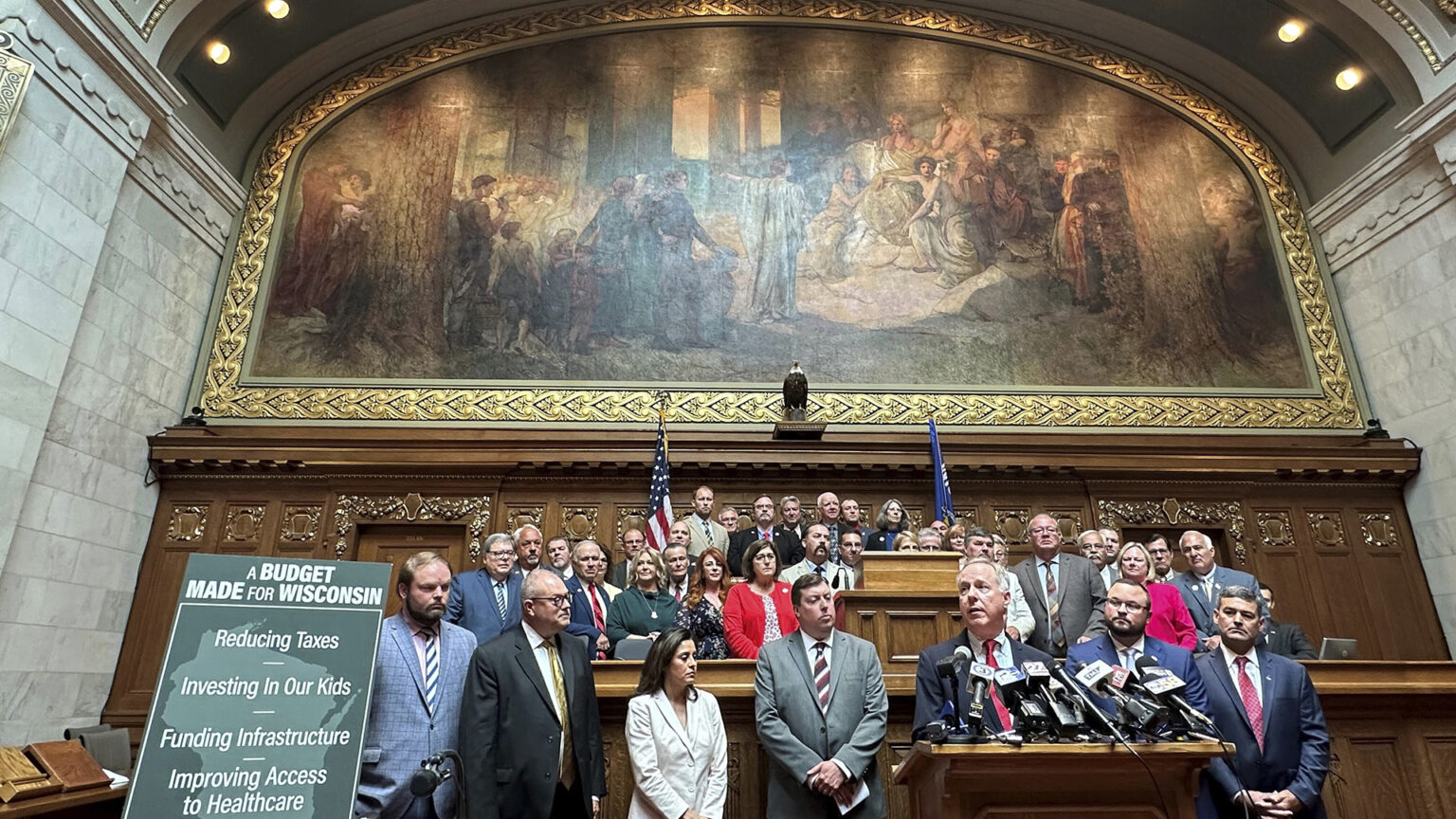Wisconsin Assembly passes 2023-25 budget, which goes to governor for review
Republicans in the Wisconsin Assembly rejected Democratic amendments before passing a state spending plan along party lines — Gov. Tony Evers may make changes with partial vetoes or reject the entire budget.
Associated Press
June 30, 2023

Wisconsin Assembly Speaker Robin Vos, surrounded by fellow Republican lawmakers, touts the GOP-written state budget at a news conference in the Assembly chamber ahead of a vote to pass the two-year spending plan on on June 29, 2023, in Madison. (Credit: AP Photo / Scott Bauer)

MADISON, Wis. (AP) — A two-year spending plan that would cut income taxes across the board, increase funding for K-12 schools and cut the University of Wisconsin’s budget in a fight over diversity, equity and inclusion programming was sent to Democratic Gov. Tony Evers on June 29.
Republicans who passed the budget in the state Assembly touted it as an investment in the state’s priorities by cutting income taxes by $3.5 billion, reducing the number of brackets to move closer to a flat tax, increasing funding for K-12 public and private choice schools, and increasing pay for prison workers, prosecutors and public defenders.
The budget also would raise pay for all state employees by 6% over the next two years.
Assembly Speaker Robin Vos said the budget, some parts of which were reached with bipartisan support, was a victory for taxpayers.
Democrats, who didn’t have the votes to stop the Republican-authored plan, said it was a missed opportunity given the state’s projected $7 billion budget surplus. They argued that Republicans disregarded the needs of the working class to enact a tax cut that benefits the wealthiest taxpayers.
“This budget just does not meet the historic needs of this moment,” Democratic Minority Leader Greta Neubauer said before debate began.
The Senate passed the budget on June 28 on a nearly party-line vote, with no Democrats in support. The Assembly rejected all Democratic amendments before passing the budget on June 29 by a 63-34 vote along party lines.
Evers could make changes with his partial veto or even wipe out the entire budget, though that would be unlikely as it would require lawmakers to start over and scrap aspects that Evers helped craft.
Evers hasn’t said what he will do. Republicans tried to write the budget in such a way that it would be difficult for him to make substantial changes even with his line-item veto power.
“We trust he will use his power to do the right thing by the people of Wisconsin when he gets it,” Neubauer said, dodging questions about whether she would support him vetoing the entire budget.
Evers previously threatened to veto the entire budget over the University of Wisconsin’s $32 million cut, funding that Republicans identified as going toward diversity, equity, or DEI, programming and staff. But the budget would allow for the university to get the funding later if it could show it would go toward workforce development and not DEI.
Republicans also refused to fund UW’s top building project priority, a new engineering facility on the Madison campus. The university, backed by the state’s business leaders, urged lawmakers to reconsider, saying the new building would get at the heart of Republicans’ goal of workforce development because it would allow for more students to graduate with engineering degrees.
The cut to UW stands out in a $99 billion budget where funding was increased or at least held steady across state government. Public K-12 schools, for example, would see a $1 billion funding increase under a deal Republicans reached with Evers that would also bolster funding for local governments by $1 billion.
Democrats also object to a $3.5 billion income tax cut that would benefit wealthy filers more than lower-income earners. The tax cut shrinks Wisconsin’s brackets from four to three, moving it closer to the flat income tax rate in neighboring Illinois.
Evers had proposed an income tax cut more targeted to lower- and middle-income earners.
“The goal is to try and keep successful people in Wisconsin no matter what their income,” Vos said in defense of the tax cuts for wealthier filers.
Republicans defend their cuts to a child-care program and a state office of school safety, saying they don’t want to commit too much of the surplus to areas that require ongoing spending.
The budget covers the two-year period that begins Saturday and runs through June 30, 2025. Current spending levels will continue until Evers signs a new budget.
Associated Press writer Harm Venhuizen contributed to this report.
 Passport
Passport











Follow Us